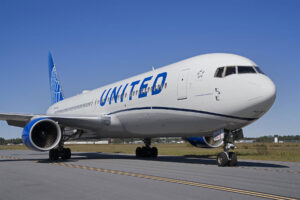Operating a medical machine on board.
#1
Original Poster
Join Date: Nov 2009
Posts: 1
Operating a medical machine on board.
I plan to take a relative patient to New York from India . We need to
carry a suction machine on board for the patient. The machine operates for 3 hrs on a charged battery. But the total suctioning time on board MAY exceed
3 hrs. The machine also operates on 110-230 volts AC, 50-60 hz.
And also has a 12V DC operation.
Please advise;
*If it will be possible to run/ charge this machine on an AC/ DC outlet on board in business or first class.
*Which airline would be most appropriate for a reliable power source?
*I thought of taking AIR INDIA non-stop (777 -200) to JFK . Do you think they have a reilable power source?
Shall I make a connecting journey instead on a different airline?
thanks
carry a suction machine on board for the patient. The machine operates for 3 hrs on a charged battery. But the total suctioning time on board MAY exceed
3 hrs. The machine also operates on 110-230 volts AC, 50-60 hz.
And also has a 12V DC operation.
Please advise;
*If it will be possible to run/ charge this machine on an AC/ DC outlet on board in business or first class.
*Which airline would be most appropriate for a reliable power source?
*I thought of taking AIR INDIA non-stop (777 -200) to JFK . Do you think they have a reilable power source?
Shall I make a connecting journey instead on a different airline?
thanks
#2
A FlyerTalk Posting Legend
Join Date: Apr 2001
Location: PSM
Posts: 69,232
Welcome to FlyerTalk!
Every seat on Continental's 777-200s - the planes they use for India service - has a 110V/60Hz Universal Adapter plug (2 plugs for every 3 seats in coach). That will meet your needs from a power perspective. I'd be interested to know if the airlines would permit such a patient in transit as it seems there is a more significant risk of medical emergency or diversion.
Every seat on Continental's 777-200s - the planes they use for India service - has a 110V/60Hz Universal Adapter plug (2 plugs for every 3 seats in coach). That will meet your needs from a power perspective. I'd be interested to know if the airlines would permit such a patient in transit as it seems there is a more significant risk of medical emergency or diversion.
#3
Join Date: Jul 2001
Location: DTW
Programs: Dirt Status w/ All
Posts: 5,041
It is not just the presence of an outlet, it is also the power required. Most airlines limit the power available to around 75 watts - often not even enough to run and charge a laptop battery at the same time.
I agree this may be a situation airlines may deny you travel for. You really need to clear this with the airline before you book.
I agree this may be a situation airlines may deny you travel for. You really need to clear this with the airline before you book.
#4
FlyerTalk Evangelist
Join Date: May 1998
Location: Massachusetts, USA; AA Plat, DL GM and Flying Colonel; Bonvoy Platinum
Posts: 24,236
Airline seat power is generally reliable, but it has been known to be inoperative - at an individual seat, in which case you might be able to change seats or run your cord to a nearby seat, but occasionally throughout the whole plane. You might not know this until you're in the air. If this is a life-or-death situation, I would take shorter flights, with connections long enough to recharge on the ground. (Bring adapters for the outlets of whatever country/countries you connect through, though you could probably buy them at airport shops.)
Absolutely. You don't want to show up at the airport and be turned away.
Absolutely. You don't want to show up at the airport and be turned away.
#5
Join Date: Jul 2001
Location: DTW
Programs: Dirt Status w/ All
Posts: 5,041
I think it is important that the OP considers:
1. If the device becomes inoperative for any reason, what has to happen - a medical diversion or continue on with some discomfort? If a diversion would be required I think you would need to look at a medical evacuation carrier. Also consider that even a short flight can become hours longer due to weather, ATC, etc.
2. Is it practical to use in the confines of an airline cabin? I truthfully have no idea how this device works or what it is for, but googling the phrase brings up some images that don't exactly appear to be something you can use easily in an airplane.
3. Does the patient require assistance throughout the flight? What happens if turbulence requires everyone to be belted in?
4. Will it cause discomfort for other passengers? Will it interfere with others ability to sleep, eat, etc?
1. If the device becomes inoperative for any reason, what has to happen - a medical diversion or continue on with some discomfort? If a diversion would be required I think you would need to look at a medical evacuation carrier. Also consider that even a short flight can become hours longer due to weather, ATC, etc.
2. Is it practical to use in the confines of an airline cabin? I truthfully have no idea how this device works or what it is for, but googling the phrase brings up some images that don't exactly appear to be something you can use easily in an airplane.
3. Does the patient require assistance throughout the flight? What happens if turbulence requires everyone to be belted in?
4. Will it cause discomfort for other passengers? Will it interfere with others ability to sleep, eat, etc?
#6
Join Date: Sep 2004
Location: DEN
Posts: 1,962
Definitely check with the airline.
You may also wish to post this question in the Disability Travel forum.
You may also wish to post this question in the Disability Travel forum.
#7
FlyerTalk Evangelist
Join Date: Oct 2001
Location: Seattle
Programs: AA PLT 2MM+; Marriott PLT
Posts: 16,376
The specific medical device must be approved by the airline. I use a CPAP and while several airlines permit them (Cathay even has a special seat in J for this small device), the particular model I use had not been approved. I could convince either the airline or the equipment maker to initiate the approval process.
#8
Join Date: Aug 2007
Location: Atlanta/DC
Posts: 297
Without knowing specifics and only drawing conclusions from your post, I have a very high suspicion that this should be dealt with by a private medical jet and not on a commercial airline.
If something causes a diversion, you could be held accountable for millions of dollars.
If something causes a diversion, you could be held accountable for millions of dollars.
#9
A FlyerTalk Posting Legend
Join Date: Apr 2001
Location: PSM
Posts: 69,232
Definitely check with the airline.
You may also wish to post this question in the Disability Travel forum.
You may also wish to post this question in the Disability Travel forum.
#10
Join Date: Jun 2008
Posts: 975
Like SeAAtle, I travel with a CPAP machine. In the past I used to fork out for WT+ with BA because of the availability of their power points. But now they won't allow you to use these for a CPAP because it takes too much power out of the circuit - laptops are fine.
And other airlines simply don't have power points available in classes of travel I can afford. (And those that do, such as Air Canada, have warnings in the small print - the very smallest print!! - that point out that CPAPs are not allowed to be run from onboard power for the same reasons as BA state (see above).)
I have found that a laptop battery the size of a small paperback book will supply me with 5.5 hours power, ideal for TATL after meal services/films etc have been taken into account. Mine recharges very quickly - about 3 hours max - from the mains on arrival.
This has given me new freedom, less concern from security and cabin crew and my seat companions haven't even noticed.
If your device can run from a similar battery or a series of them, this might be the answer for you.
And other airlines simply don't have power points available in classes of travel I can afford. (And those that do, such as Air Canada, have warnings in the small print - the very smallest print!! - that point out that CPAPs are not allowed to be run from onboard power for the same reasons as BA state (see above).)
I have found that a laptop battery the size of a small paperback book will supply me with 5.5 hours power, ideal for TATL after meal services/films etc have been taken into account. Mine recharges very quickly - about 3 hours max - from the mains on arrival.
This has given me new freedom, less concern from security and cabin crew and my seat companions haven't even noticed.
If your device can run from a similar battery or a series of them, this might be the answer for you.
#11
Moderator: Mileage Run, United Airlines; FlyerTalk Evangelist
Join Date: Jan 2004
Location: The City/Honolulu
Programs: UA 3MM; Hyatt Glob*****; Hilton Diamond
Posts: 14,473
Check with the Medical Desks of the airlines that service your intended route. UA will bring power to the seat for approved medical devices. I do not know about other airlines, however.




















